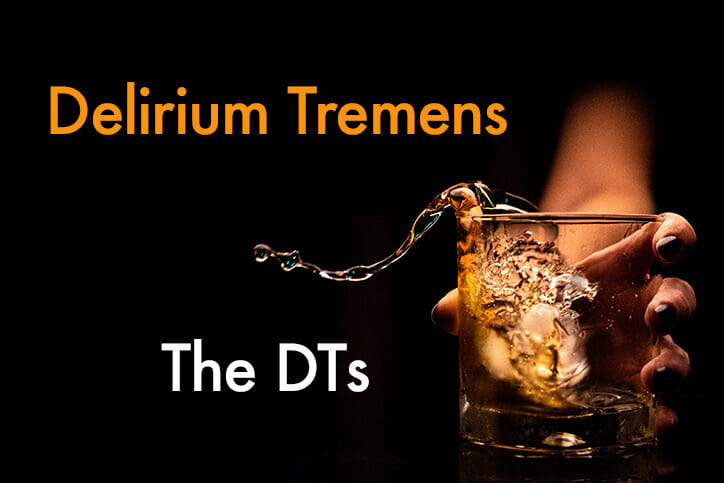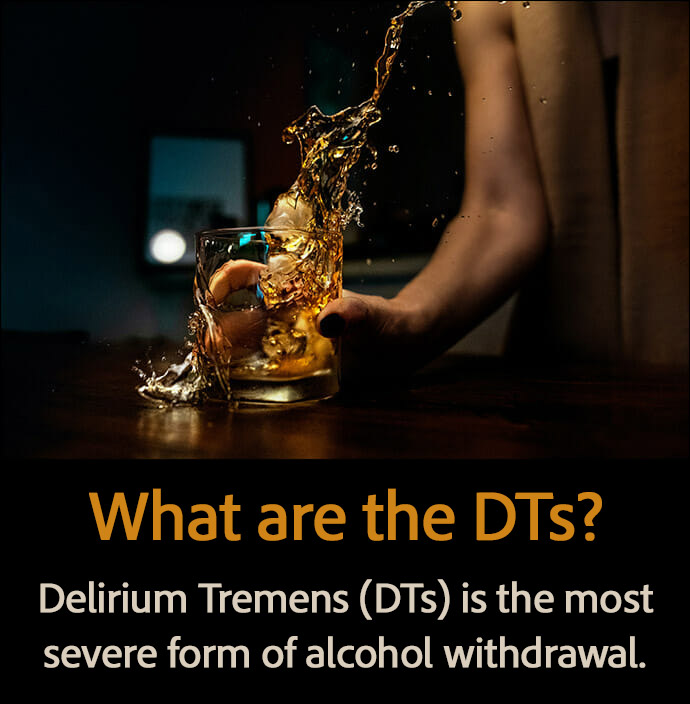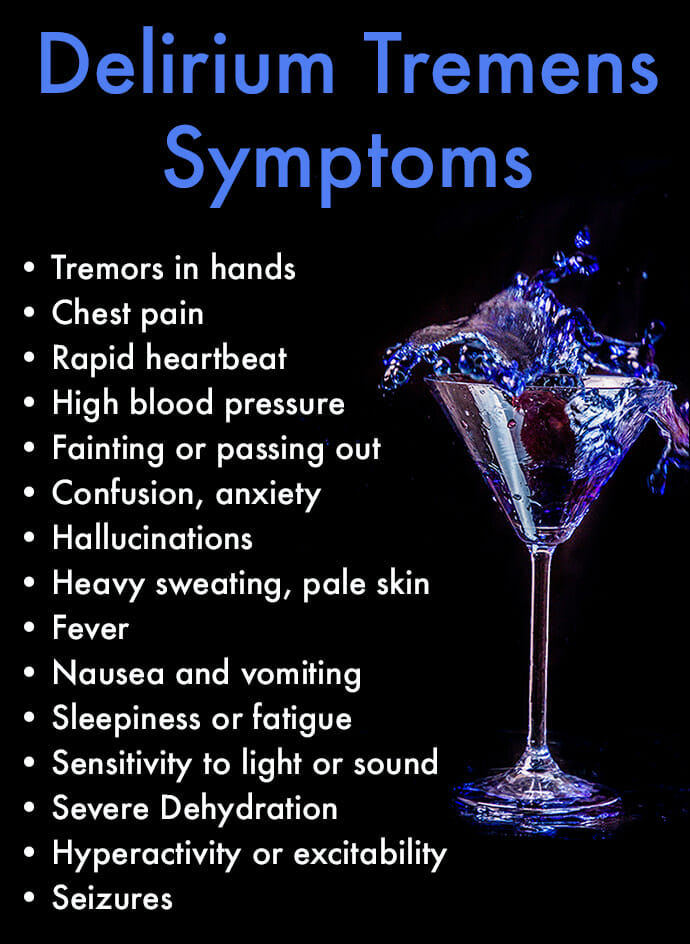Table of Contents
Alcohol withdrawal can be extremely dangerous and uncomfortable. Anyone who has ever suffered from a hangover has experienced a mild version of it. The most extreme form of alcohol withdrawal is known as Delirium Tremens, also called the DTs, or “the shakes.”
As one of the most serious negative effects of alcohol, delirium tremens can be dangerous and potentially fatal in severe cases.
Understanding the possible consequences of enduring delirium tremens symptoms might motivate long-term or heavy drinkers to seek treatment to avoid alcohol withdrawal complications.
What are the DTs – Delirium Tremens?
Delirium Tremens is the most severe form of alcohol withdrawal and is most common among heavy, long-term drinkers.
These are generally people who have lived with an alcohol use disorder for a decade or longer, though it is possible for someone living with severe alcoholism for a shorter amount of time to experience the DTs.
The Centers for Disease Control and Prevention (CDC) defines heavy drinking as consuming 15 drinks a week or more for men, and eight or more drinks a week for women.
Approximately 5% of people suffering from alcohol withdrawal will experience delirium tremens or the DTs.
Individuals most at-risk for delirium tremens symptoms can include:
- Heavy alcohol drinkers
- Long-term drinkers
- People who have gone through alcohol withdrawal before
- Those with a history of seizures
- Younger, unmarried, adult white men
Anyone experiencing delirium tremens DTs should be under medical observation and care. If left untreated, alcohol withdrawal delirium can lead to a heart attack, stroke, seizures, or death.
What Causes The DTs?
Delirium tremens is primarily caused when individuals with a long-term physical dependence on alcohol abruptly stop drinking.
Giving up alcohol “cold turkey” without proper treatment in a detox facility is always discouraged for heavy or long-term drinkers because alcohol withdrawal can lead to sudden and serious changes to a person’s brain chemistry and central nervous system.
Alcohol is a depressant that slows down the brain and nervous system. These two systems can’t adjust quickly enough when a heavy or long-term drinker abruptly stops their alcohol consumption.
The brain actually becomes over-stimulated from the lack of the depressant in the system when alcohol is removed, causing dangerous physical and mental symptoms.
Sometimes heavy drinkers that stop “cold turkey” experience a surge of the amino acid glutamate that can cause symptoms similar to delirium tremens, such as extremely high blood pressure, tremors, anxiety, and seizures.
One reason it’s so crucial for people with a long history of alcohol abuse to seek professional addiction treatment is that the symptoms of delirium tremens may not appear right away.
Delirium Tremens Symptoms
With the DTs, delirium tremens symptoms can appear quickly, but for most people, they can start anywhere from two to five days after a person’s last drink.
In other cases, the symptoms have been known to begin seven to 10 days after a person stops consuming alcohol.
Regardless of when the DTs symptoms start, they can be extremely dangerous to a person’s health.
Delirium Tremens Symptoms can include:
- Tremors in the hands, feet, and muscles
- Chest pain, rapid heartbeat, or high blood pressure
- Fainting or passing out completely
- Confusion, anxiety, or hallucinations
- Heavy sweating, pale skin, or fever
- Nausea and vomiting
- Sleepiness or extreme fatigue
- Sensitivity to light, touch, and sound
- Severe Dehydration
- Extreme hyperactivity or excitability
- Seizures
Severe alcohol withdrawal causes an imbalance in the minerals and nutrients that control so many of the body’s functions, including breathing and blood circulation. When this happens it can lead to a life-threatening medical emergency.
Anyone experiencing the above symptoms should call 911 immediately.
Delirium Tremens Treatments
Delirium tremens treatments usually begin with a diagnosis that involves a physical exam, along with an open and honest discussion about a person’s medical history and regular levels of alcohol intake.
Many physicians will also require a blood sample to measure magnesium and potassium levels, as well as tests for liver and heart function.
Delirium tremens treatments often start in the hospital because it is, without question, a dangerous medical emergency.
A patient experiencing the DTs from alcohol must be monitored to minimize delirium tremens symptoms and prevent complications that can lead to death.
Benzodiazepines and anti anxiety medication like Valium, Ativan, and Xanax, can be helpful for reducing the symptoms of alcohol withdrawal and lessen the anxiety associated with the DTs.
Introducing a nutritious diet is a key factor in treating delirium tremens. This is because many people struggling with an alcohol use disorder have extremely unhealthy diets and in fact, are often malnourished.
During the acute phase of delirium tremens or alcohol withdrawal delirium, it’s necessary to first stabilize the individual.
Hospitalization for the DTs can last for as long as a week. After being discharged from the hospital, long-term treatment for alcohol use disorder in a residential alcohol rehabilitation facility can promote recovery and a healthier lifestyle.
Treatment for Alcohol Use Disorder
Usually only long-term drinkers experience delirium tremens and they often require a treatment program to recover from alcohol addiction. They may have tried to quit drinking before but were unable due to a variety of reasons.
Experiencing uncomfortable alcohol withdrawal symptoms when trying to quit drinking is one reason why some people continue to drink. They drink to avoid withdrawal, but it becomes a never-ending cycle, whereas treatment is a safer and healthier option.
Alcohol detox is the often the first phase of treatment for most people, although an individual recently discharged from the hospital for the DTs might not need it because they detoxed in the hospital.
After detox has been completed, a formal alcohol addiction treatment program will begin, and can last anywhere from 30 to 90 days or more.
Residential alcohol addiction treatment combines a range of therapies that can include:
- Individual Therapy
- Group Therapy
- Family Counseling
- Cognitive Behavioral Therapy (CBT)
- Relapse Prevention
It’s important to identify the root causes of alcohol use and addiction during recovery. Some people drink to cope with mental health issues like depression, known as a co-occurring disorder.
Co-occurring disorders of addiction and mental illness require dual diagnosis treatment to successfully overcome both conditions.
Seeking treatment for an alcohol use disorder can be helpful for anyone trying to quit drinking, but for those who have suffered with delirium tremens, it can be a vital necessity.
The safest and healthiest approach is to begin a recovery program before alcohol dependence or addiction reaches the point where the DTs become a problem.
Frequently Asked Questions
What is a basic delirium tremens definition?
Delirium tremens can be defined as the most severe form of alcohol withdrawal that occurs when a person who has been drinking alcohol excessively for a long period of time suddenly stops and experiences dangerous physical and mental symptoms that can include tremors, hallucinations, and seizures requiring immediate medical attention.
What are the early signs of delirium tremens?
Some of the early signs of the DTs occur within a few days after a person stops drinking alcohol and can include:
- Anxiety and irritability
- Sensitivity to sound and light
- Sweating
- Tremors or shaking in the hands
- Disorientation
- High blood pressure
- Rapid heart rate
- Insomnia
- Nausea or vomiting
- Hallucinations
How can delirium tremens be fatal?
Severe delirium tremens symptoms can be fatal and require professional medical attention for a variety of reasons.
The most dangerous symptoms include:
- Wernicke Korsakoff Syndrome symptoms
- Respiratory failure
- Cardiac arrest or heart failure
- Seizures
- Extreme dehydration
- Organ failure
How long can delirium tremens last?
Delirium tremens symptoms typically last for approximately 2 to 5 days although it’s possible for some individuals to experience mild signs to persist for a longer period of time.
The acute symptoms of DTs generally last for several days and peak around day 4 or 5. Mild fatigue, anxiety, and problems sleeping may continue for several weeks, especially for those with co-occurring disorders.
How can delirium tremens be prevented?
The only clear-cut way to avoid delirium tremens is to abstain from drinking alcohol, or at least only drink occasionally in moderation.
This can be difficult for people with a dependence or addiction to alcohol. If that is the case, do not stop drinking abruptly without seeking professional medical treatment first.
For long-term alcohol use, an alcohol detox program is necessary to stop drinking while safely addressing the withdrawal symptoms under proper supervision. After detox, it is recommended to attend an alcohol treatment program.
How do the DTs differ from other alcohol withdrawal symptoms?
The DTs differ from milder forms of alcohol withdrawal or a hangover in the severity, duration, and dangers of the symptoms.
Delirium tremens is the most severe and dangerous form of alcohol withdrawal.
A hangover or mild withdrawal occurs within 24 hours of the last drink, often as early as 6 to 8 hours, and only lasts for one or two days. Symptoms of the DTs may not begin for several days and can last for another 3 to 5 days.
Almost anyone can experience a mild form of alcohol withdrawal, yet only about 5% of the population will encounter severe delirium tremens symptoms.
How long or how much do you have to drink to get delirium tremens?
There is no specific amount or duration of alcohol use required for developing delirium tremens as it will affect each person differently.
Individuals who have been drinking large amounts of alcohol for more than 10 years are at an elevated risk of experiencing the DTs if they stop drinking all at once.
It’s possible for those who drink excessively on a daily basis for several months to also develop symptoms, although it is not as common.





